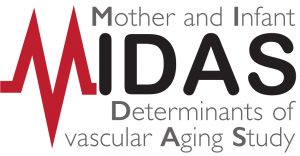A collaboration among the departments of Obstetrics & Gynecology, Emergency Medicine, and Exercise & Sports Science has received a $2.75 million grant through the Center for Women’s Health Research at UNC to understand early detection of subclinical disease – key to CVD risk stratification and prevention.

Kim Boggess, MD, (Obstetrics & Gynecology) and Michelle Meyer, PhD, MPH, (Emergency Medicine) along with Lee Stoner, PhD, MPH, MA, (Exercise & Sport Science) and Marcella Boynton, PhD, (Internal Medicine) have received a $2.75 million R01 through the Center for Women’s Health Research at UNC to conduct a prospective, multicenter study to estimate cardiovascular disease (CVD) risk in healthy and medically complicated pregnant women and their infants. This study represents a partnership between the departments of Obstetrics & Gynecology, Emergency Medicine, and Exercise & Sports Science to understand early detection of subclinical disease – key to CVD risk stratification and prevention. Since prenatal and postpartum care is the sole health care access point for most U.S. women, pregnancy represents a critical opportunity to measure CVD risk and implement innovative strategies to address this critical gap in women’s health care. Furthermore, CVD risk factor trajectories begin in utero and in early life, so pregnancy is also an opportunity to identify CVD risk in children.
Their long-range goal is to identify and disseminate obstetric care practices that mitigate CVD risk for women and their children. The objective of this prospective, multicenter Mother and Infant Determinants of vascular Aging Study (MIDAS) is to estimate CVD risk in 840 healthy and medically complicated pregnant women and their infants from birth to 18 months postpartum. Primary outcomes are maternal and infant central pulse wave velocity (PWV), a validated measure of arterial stiffness (vascular aging) that predicts CVD, independent of other established CVD risk factors. The project will also examine the relationships among personal, social, and ecological factors and CVD risk for 18 months postpartum. Study sites include UAB Birmingham and Columbia University.
The findings of this research will inform future studies on CVD screening strategies to identify mother/infant dyads at greatest risk for early arterial stiffness, a harbinger of CVD later in life. This proposal represents a paradigm shift in prenatal care, laying the groundwork to use pregnancy as an opportunity to identify and modify CVD risk in mother/infant dyads. This study would be the first to evaluate the association of arterial stiffness in a diverse population of mother/infant dyads.